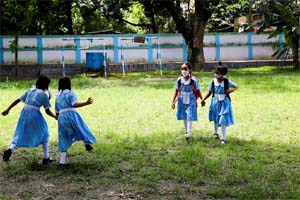World Population Day
Views
Md Nuruzzaman Khan
World Population Day, which has been observed on July 11 every year since 1989, holds significant importance in addressing critical population-related issues. This year, the focus is on gender equality, symbolised by the theme of “Unleashing the power of gender equality: Uplifting the voices of women and girls to unlock our world’s infinite possibilities.”
The theme strongly resonates with Bangladesh, which ranks 71st out of 146 countries in the 2022 Global Gender Gap analysis. Despite this position, Bangladesh still has the highest level of gender parity in South Asia. However, there is still much progress to be made in several key indicators of gender inequality, including early marriage, violence against women, and women’s empowerment.
It is important to note that these indicators are central to Sustainable Development Goal (SDG) 5, which prioritises gender equality and women’s empowerment. Furthermore, they have indirect implications for other SDG indicators, such as universal access to sexual and reproductive healthcare services and the reduction of maternal and under-five mortality. Consequently, unless greater priority is given to reducing gender inequality, Bangladesh faces the risk of not achieving several SDGs by 2030.
Ensuring gender equality in Bangladesh poses significant challenges, particularly when addressing deep-rooted social norms. These norms, shaped by cultural and traditional beliefs, often perpetuate gender disparities and hinder progress towards achieving equality. One major challenge is the prevalence of early marriage, with 51 percent of women being married off before the age of 18, as per Unicef data. This higher occurrence is reported despite the country having strong laws against child marriage, a practice that is influenced by community-level norms endorsing early marriage, such as previous generations also being married at a young age. These norms restrict women’s education, limit job opportunities, and contribute to a cycle of inequality. Additionally, community norms in Bangladesh reinforce male superiority, leading to the acceptance of gender-based violence and discrimination. For instance, one in every four women and girls in Bangladesh experiences physical and sexual violence from her partner. Underreporting of such violence is common due to social norms that discourage discussions on such matters. Furthermore, societal expectations prioritise women’s roles as wives and mothers over their need to pursue education and careers, thus limiting their personal growth and professional development. Traditional gender roles dictating women’s submissiveness and subordination further restrict their decision-making power and autonomy.
Overcoming these deeply ingrained community norms is crucial for achieving gender equality in Bangladesh, and it calls for a multi-faceted approach that raises awareness, challenges traditional beliefs, and empowers women and girls. Improving the quality of education and actively engaging parental generations can play an effective role in achieving these goals. However, it is important to acknowledge that the country still faces challenges in both aspects.
Bangladesh has made significant progress in reducing the gender gap in education. The primary education enrolment rate is around 98 percent, with a higher female-to-male ratio. This achievement is due to the government’s comprehensive efforts for universal education, including initiatives such as stipends, mid-day meals, and free textbooks distribution. However, disparities in educational completion become evident as we move up the degrees of education, with women experiencing a lower completion rate compared to men. Additionally, women’s participation in science, technology, engineering, and mathematics (STEM) is much lower than that of men, which limits their access to managerial and senior positions. These disparities are primarily influenced by challenges in the education system, cultural norms, and the patriarchal nature of communities.
The education system in Bangladesh can effectively address these challenges by implementing initiatives to ensure education completion. These may include monitoring school attendance, promoting girls’ participation in STEM fields with additional support, and creating a strong foundation among women to discourage early marriage by building awareness. However, these measures are often lacking as the education system tends to prioritise grades and certificates over providing a holistic education that prepares students for life. Furthermore, the current practice of recruiting for employment through exams in subjects unrelated to higher education discourages women from continuing their education and contributes to early marriages. This is because the lengthy preparation period for these exams, which can last three to four years or longer, makes it difficult for women to sustain after completing their education, leading to a lack of hope and motivation to continue their studies instead of getting married.
Bangladesh is currently undergoing a rapid cultural transformation, which also poses challenges to women’s education and empowerment. One significant aspect of this transformation is the increasing interaction between male and female students facilitated by advancements in technology, including the role of social media. However, many parents still hold negative views about these interactions, even if they are not of an intimate nature. Consequently, in such cases, parents may opt to arrange marriages for their daughters instead of allowing them to pursue higher education.
To effectively address these issues, it is crucial to engage parents within the mainstream education system and establish a life-oriented educational approach that prioritises girls’ empowerment and holistic development. As of now, it is evident that the country’s response to these challenges remains insufficient.
Dr Md Nuruzzaman Khan is an assistant professor at the Department of Population Science of Jatiya Kabi Kazi Nazrul Islam University in Mymensingh, Bangladesh.



